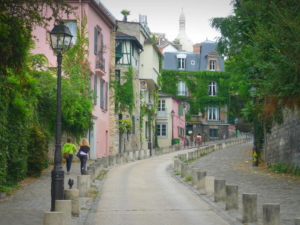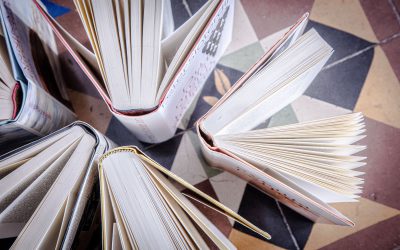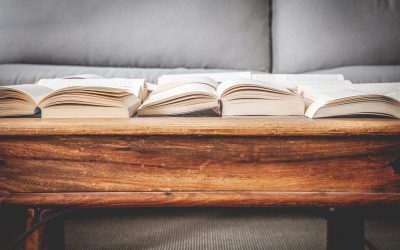A House with Cherry Trees
The car was parked at a fork in the road. The windows were rolled down, moist spring air washed inside. The road snaked along the foot of a plateau, between mimosas and naked trees. The Luberon Massif rose behind them on the other side of the valley. They were underwhelmed but perhaps it was due to the season. Merely a couple of villages on the steep hills. Even now, off-season, it was impossible to find a somewhere to park. The meadows were brown, the first shoots were just starting to poke out of the fields.
“How did you like the house?” he asked and drummed on the steering wheel with his fingers.
She glanced at him and shook her head.
“Yeah, of course you’re right,” he nodded a little too emphatically. “The grilles everywhere, the ugly floors. Although with a little imagination it’d be possible to make something of it. The garden wasn’t bad.”
She frowned.
“Well then let’s see what happens. A little steep, wasn’t it?”
“But the house is fantastic.” She sat up in her seat. To her, the cheerfulness in her voice sounded odd after the long morning, the breakfast at the B&B whose owner had stood next to them and given them tips for day trips. Hubert always wanted to chat with anyone and everyone, but at least that way the couple at the next table didn’t notice the silence. It had started the day before during the drive south, around Orléans, after the swift, happy departure from Paris, had exploded shortly before Lyon, without them stopping because of it, and from Valence on it hung heavily in the car. Upon arriving at the house in Lagnes, which an English couple had transformed into a charming little guesthouse, they hadn’t accepted the dinner offered. Instead, they had croque-monsieurs in a snack bar with paper tablecloths, then retreated to their room. The bed, with its yellow brocade cover, was so wide that even the slightest touch could be avoided.
“Who are the current owners?” She sensed his relief that she was prepared to talk. Inside her, defiance and compassion struggled for mastery.
“A German couple. Artists, I believe.”
“And why do they want to sell? Always good to know.”
She shrugged her shoulders.
“Then we’ll have to ask them,” he said. A red sports car pulled up next to them. Its driver bent towards the open window on his passenger side, inquiringly pronouncing the last name Sarah had given him.
“Monsieur Laurent,” Hubert said, giving his own last name. “I’ll just follow you.”
She pictured the white well with its wrought iron pulley in front of her. The bench next to the side of the house where she would sit, a book in hand and reaching for a bowl of cherries with the other. Everything would take on a certain distance. The mirror in the bathroom, in front of which she had slowly swollen. The bed in which she had slept the day before the hospital and in which she had slept the day after the hospital. With a swollen belly and then without. Without anything. It wasn’t right that everything around them stayed the same as it ever was. Life, objects. They were going to leave it all behind.
At the end of the valley a road led past a series of modern blocks of flats and through several serpentine curves up a hill covered with gnarled wine stocks. They finally made way for fruit trees, through which they soon saw the stone house with lime green shutters. A windblown cypress towered over the old roof. “Those are all cherry trees,” the estate agent said after they had parked in front of a dark garage door and shaken hands. He made a broad sweeping gestures with his arm. The trees protruded from a field pockmarked with patches of bare earth.
“Right, that was in the advert,” Sarah said. A woman with shoulder-length grey hair approached them, the pink sweater worn over her long grey wool dress billowed in the cool breeze.
“What an unpleasant day,” she said in stony French.
They ascended the clayey drive to the house, before which a well with a pulley actually stood, but there was no bench from which one could have gazed out onto the countryside. The tall tree stretched harsh branches into the quick-moving cloud cover, which revealed a patch of blue from time to time. On one side there was a row of pines, behind which the new housing development was vaguely perceptible.
“This is my husband,” the woman said, adding in German to the man with the white hair and beard: “This is the young couple that wants to look at the house.”
“Guten Tag.” Sarah stepped towards him and shook his hand. The man seemed confused. “We live in Paris but I also come from Germany.”
“Whereabouts?” he asked. His glassy gaze was almost eerily intense.
“From the south. And yourself?”
“Freiburg. We’re from Freiburg.”
“We’ve been here for thirty years,” the woman said. “Time to go back.”
“To Germany? Could you manage to?”
The woman tilted her head to the side and smiled carefully. Her face had the pleasant wrinkles of inner placidity. Her green eyes would have been youthful if her gaze hadn’t been fixed on the middle distance. “We’re not spring chickens anymore.” Her husband stood in the passage to the kitchen in which the colourful tiles stood out from the white walls. Inside, everything was white masonry, with rounded corners and surfaces rubbed smooth over the years. Patterned fabrics in ochre and terracotta gave the attached living room an intimate touch. The colourful cushions were an invitation to take a seat. Sarah said to herself that it must have been the wife who chose the colours. The thought crossed her mind that the man hadn’t even noticed them.
Hubert and the estate agent had already gone upstairs. “This isn’t on the photos,” said the estate agent by way of explanation, “but you know that art is a matter of taste.” Sarah followed them up the uneven steps to a small mezzanine. On a wooden stand stood a sculpture of a naked woman with a shock of bright blue pubic hair. Her gaze quickly skipped past it to the handful of books and the large conch paperweight on the desk. The estate agent described the south-west orientation of the bedroom to Hubert, who stood hunched over as if he feared the ceiling might sink even lower. There were two doorless passages leading from the nook with the nude, as if hollows had been carved into a boulder and plastered white. Sarah was tempted to return to the nude and place her hand on its head.
The bedroom was an alcove with a comfortable bed between two walls, covered with same warm fabrics as downstairs. Burgundy dominated. Bookshelves were built into the remaining walls. A safe place, where she could be secure, from whose window she could look out upon cherry trees and not have to think about how she would cope with the next day. Or even this one. Sarah had resigned from the press agency. Legally, she would have been obliged to return to work a week after the burial. No child, no maternity leave. Hubert had stood at the window as she called the office and they accepted her resignation. He travelled so much that it wouldn’t make much difference where he lived. Down here, the closest airport was Marseilles. Sarah had long yearned for the country. Digging her hands into the soil, planting seeds, watching them grow. She would have other children. Children belong in nature, not on narrow pavements next to parking cars. She had been thankful that Hubert had not repeated his objections, saying how alone she would be during his travels, how unpleasant winter could be, even in the south of France, no more movie nights with her friends. He generally hadn’t said much since then. Nothing, at any rate, that would have built on their previous conversations. He had switched to business mode. Innocuous conversations, all emphatically light-hearted. Whenever she looked at him now, she noticed the port-wine stain over his right eyebrow. Then the same thought: he should have had it taken care of after all. It was getting harder and harder to lower her gaze from it to his pale, helpless iris. A dark wooden door led from the bedroom to a large room packed with baskets full of scraps of fabric, stones, pieces of wood, metal printer’s type, printed paper, string, and a host more. The walls were piled with stacks of boxes, between which sketches of delicately coloured landscapes were fixed to the wall with dark tape. Sarah approached a landscape of blossoming cherry trees.
“How beautiful.”
The woman nodded with a melancholic smile.
“The drawings are by our daughter.”
Sarah moved on to another, a depiction of the house with the well in the foreground from the perspective of an observer standing immediately in front of it. The tall tree bent its branches overhead, as bare as they were now. “She was ill,” the woman added, as if to herself.
The husband stood motionless in the doorway and gazed at the wall with the drawings. He appeared hesitant to enter the room. “This is where I work,” the woman had said. The fruits of her labour were nowhere to be seen. The view through the window was of a patchwork of fields and pines down to the village, whose ancient core piled high and bright on the hill. Hubert motioned her to a window, wanting to show her something. Sarah went up to the wife, who was looking over her collection of materials as if already mentally disposing of the baskets and boxes.
“You can leave the things here,” Sarah said. The woman looked at her sceptically. “I mean all of this. If you can’t take it along. I would enjoy working more with my hands.”
The woman mumbled an apology and went over to her husband, who was leaning angled against the white corridor like a crucifix that had slipped to one side. She took him by the arm and slowly led him down the stairs, past the nude sculpture into the kitchen, where she set him down on the padded stone bench.
“Where do you want to go?” Sarah had followed her. The woman turned to face her as if to an image from a dream that she couldn’t shake off, and then filled the kettle.
“To Freiburg?”
The husband now seemed completely oblivious to her.
“We’ll see. We have a son with family in Berlin, but we don’t want to be a burden.” She reached for a tea caddy, opening it and sniffing at it before inserting a spoon with a crunch.
“What could you possibly want from this place?” The man’s voice rang harshly through the room, startling Sarah.
“Karl,” the woman said. The man ran a powerful hand through his still thick white hair. The fist landed on the wood table, clattering the lid of the sugar bowl.
“Bloody hell, we haven’t had visitors for a long time. Isn’t that right, Irmgard?”
“Yes, Karl.” She placed colourful teacups on the table, carefully taking his hand and opening his fist. With her free hand, she gently stroked the vertical furrow between his eyebrows.
“So you want to leave Paris?” she said. Sarah traced the pattern on the sugar bowl with her finger.
“One withers away in the city. I want to see things grow.” She looked around. “I have the feeling that everything could have a fresh start here.”
The man sat next to her, transfixed. His wife cast him a concerned glance. He briefly started fidgeting, then jolted up, grabbing Sarah by the hand. He pulled her up and then dragged her to the door, round the front of the house. Hubert was still standing at one of the upper windows, for a second she saw him waving, from the distance, as if the way down from those upper white caves was blocked. The shadow behind him must have been the estate agent. But the harsh grip of the old man had already pulled her around the house, to the barn door they had parked in front of. Without relaxing his grip, he started fiddling one-handed with a padlock. The heavy wooden door creaked open, and she stared into the darkness shifting behind it. She thought of bats, but the silhouettes on the ceiling were much larger, and static. The man released her, as if he knew that there was no escape, and took a step back. Sarah had the feeling a corset was being loosened, only for the pale light to flicker on a moment later, and for it to pull even tighter. Above her dangled hundreds of dresses, dyed pitch black. High above, fixed to the ceiling of the barn-like space, heavy fabrics swayed on hangers, wired up like at a laundry. Row upon row of long-sleeved black dresses. Sarah thought she saw hands extended, fingers curved into the tips of black claws. Her neck ached from looking up, her ears roared, but she was aware of the danger that all of the dresses could crash down upon her as soon as she lowered her head, an avalanche of fabric stiff as boards, wire and hangers. The old man was nowhere to be seen. The last thing he had murmured was that she had to become acquainted with his daughter. A judder ran through the pulley system. She was prepared to see the old man’s feet dangling between the dresses the next moment, as his daughter had hanged from the tree next to the well one morning. She could see it so clearly, like she had once seen herself eating cherries next to the house. The door closed behind her. This is the place for ghosts, she thought. She asked herself if Hubert would try to conceal his relief when she told him that he would have to travel back to Paris alone.
Related Projects
A Day off the Island
A Day off the IslandThey locked the dogs in the garage. The girl had put one dish with food and...
Un día lejos de la isla
Un día lejos de la islaEncerraron a los perros en el garaje. La chica les dejó un cuenco con...
Aquí un mar, allá una fábrica
Aquí un mar, allá una fábricaMomar llamó desde Marrakech justo cuando me preparaba una ensalada...
Am Ende Nathalie
Am Ende NathalieAm Ende NathalieEine kleine Geschichte aus Paris, Teil eines Romans, dessen...
Der Kleiderbaum
Der KleiderbaumAn einer Weggabelung stand der Wagen. Die Fenster waren heruntergekurbelt, feuchte...
Comtesse de Sévigné auf Abwegen
Comtesse de Sévigné auf AbwegenÜber unserem Wohnzimmer, dem ausufernden Bücherregal, stand ein...





